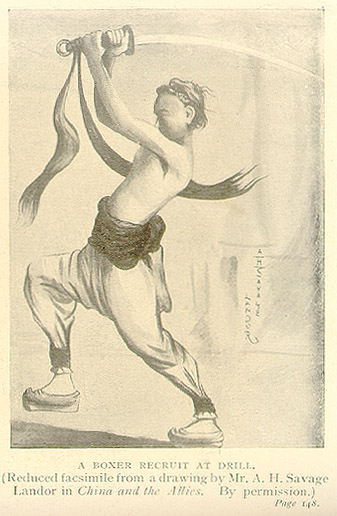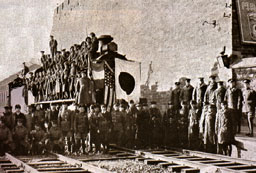
|
|
|
|
|
|
|
|
|
|
|
|
|

China never wanted foreigners any more than
foreigners wanted Chinamen, and on this question I am with the Boxers every
time. The Boxer is a patriot. He loves his country better than
he does countries of other people. I wish him success.
-Mark Twain, Berkeley Lyceum, New York, November
23, 1900
The Boxer Rebellion was a movement at the turn
of the century driven by a secret society determined to drive out the foreigners
they believed to be destroying their nation. Despite the eventual
backing of the Chinese government, the movement was failure. The
combined international response that it drew served only to emphasize China's
weakness and contributed to the downfall of the imperial government.
China holds a long tradition of
being suspicious of "foreign barbarians". Their fear and suspicion
of outsiders was only increased by the events of the Opium War in 1840
and the Arrow War of 1856. The underlying purpose of both these conflicts
was to change the manner in which China carried on foreign trade.
In both cases, China was forced to submit to the will of the militarily
superior foreign nations.
However, the foreign powers
were not content to increase merely their commercial claims in China.
Their imperialist desires led them to claim many of China's colonies as
their own. Concerned with this trend, the Chinese government attempted
to strengthen the country in order to counteract the increase in Western
influence. The failure of these efforts became painfully obvious
when China suffered defeat at the hands of Japan in the Sino-Japanese War
in
1895. This demonstration of Chinese weakness left Western nations
eager to stake their claim in China. Russia, Germany, and Great Britain
all claimed Chinese ports as their own. Italy, France, and Austria
also controlled Chinese territory. The United States, whose presence
in Asia was cemented by its control of the Philippines, was so concerned
about this unchecked claiming of ports that they issued the Open Door Policy,
an effort to protect their access to Chinese markets. As these nations
fought to establish the upper hand in China, China's empress dowager, Tsu
Hsi, was searching for ways to close China to foreigners. She issued
this statement to the Chinese provinces:
The present situation is becoming... more difficult. The various Powers cast upon us
looks of tiger-like voracity, hustling each other to be first to seize our innermost
territories... we have no alternative but to rely upon the justice of our cause... what is there
to fear from any invader? Let us not think about making peace.
While the empress dowager was concerned about foreign encroachment,
Chinese peasants were more concerned with the drought, famine, and
unemployment sweeping the nation. Many of these peasants turned to
secret societies that preached hatred of foreigners. In the northern
Shangdong province, membership in a secret society known as the I Ho Ch'uan,
translated into English as "Fists of Righteous Harmony" was growing.
Members of this group were referred to as “Boxers”
by foreigners. They practiced an animistic magic that they believed
made them impervious to pain. This leaders of this group attracted
followers by demonstrating their “magical powers”.
They would stage elaborate ceremonies in which they appeared to be invested
with supernatural powers of invulnerability. They believed that China could
start a new golden age if it rid itself of foreigners. They were
passionate, confident, and full of violent emotion. By January of
1900, the entire Western community in China was aware of the Boxers, who
boldly stated their intentions on posted placards reading "Protect the
Empire: Exterminate Foreigners".
The Chinese imperial leadership
was initially opposed to the Boxers, and went so far as to promise foreigners
ministers that they would act against them. However the empress dowager
saw an opportunity to use the group against the foreigners. She used
her ministers to influence the Boxers, eventually supporting their actions
with provincial troops. As the year 1900 dawned, Boxers roamed wild
through the countryside, launching attacks on foreigners. They specifically
targeted missionaries and their Chinese converts, obvious examples of foreign
influence, viciously slaughtering them. The Boxers then turned their
focus to cities, their numbers growing. Nervous foreign diplomats
asked the Chinese government for help, but all they received in return
were empty promises. In the spring of 1900, Boxers killed seventy Chinese
Christians. On May 29, they killed a British missionary. Foreign
ministers threatened to call up troops if the Chinese did not put a stop
to the rebellion.
Military Escalation

On June 9, 1900, the British Minister in Peking sent a telegram to
British Admiral Sir Edward Seymour and the British Consul at Tientsin urgently
requesting that additional troops be sent to protect the British legation
in the city. The next day, an international force of over 1, 500
men under Seymour's command was dispatched by train from Tientsin.
This force encountered hostile Boxers several times during its push towards
Peking. Eventually the expedition had to turn back, due to the fact
that Boxers had torn up the rail tracks. Seymour's force also ran
into troops from the Chinese army that had been dispatched to assist the
Boxers. As word of troops' movement towards Peking spread, riots
broke out across the country. The Chinese government readied itself
for war, viewing the additional troops as unnecessary, that foreign troops
already in Peking could provide adequate protection for the British legation.
The empress dowager called on provincial leaders to send troops to Peking,
preparing to counter foreign hostility.
At this time the Chinese government
did not intend to start a war, only to protect China from foreign aggression
and to use the Boxers in that defense. However at the same time that
Seymour's troops were making their unsuccessful movement towards Peking,
the Allied navies in the Gulf of Pechilhi demanded that China surrender
control of the Taku forts, which were of strategic importance. To
the Allies' surprise, the Chinese opened fire. An Allied landing
force quickly took control of the forts, but this incident made it clear
to all involved that the Allies, displeased with the Chinese government,
planned to mount a massive military campaign against the Boxers.
Under Siege
As the Allied forces made
their move, the situation grew increasingly worse for foreigners already
in China. On June 17th the Boxers attacked the area of Tientsin inhabited
by foreigners. Last minute fortifications installed by the foreigners
were the only things that saved their lives. All lines of communication
had been cut off, but a few brave men from the military forces stationed
in the city to protect the foreign legations risked their lives riding
their the Boxer lines to get help from the forces landing at the Taku forts.
This siege lasted for 27 days. Finally, on July 14 the Allies gathered
a strong enough force to defeat the Boxer forces and secure their base
in Tientsin.
In Peking, the capital, the foreigners
gathered at the British legation and fortified it for defense. With
the assistance of soldiers and marines stationed there for their protection,
the foreigners were able to hold off attacks from a combined force of Boxers
and the Imperial army. Maintaining the perimeter proved to be difficult
as the Chinese army brought in artillery to shell the legation. The
situation seemed so dire to outsiders that many outside of China believed
that everyone in the legation had been killed, and doubted the need for
a "rescue" mission. But the legation's defenses held, and on August
14 they were liberated by Allied
The Allies split Peking into eight regions,
each governed by a different nation. Soldiers and diplomats alike
looted the city. Troop build up continued, and the forces occupied
themselves and fulfilled their desire for revenge by eradicating every
last trace of the Boxers they could find. Anyone suspected of being
a Boxer or sympathetic to the Boxer cause was executed.
The foreign powers forced the imperial
government to agree to the terms of the Boxer Protocol in September of
1901. This agreement was a slap in the face for China, as it required
the stationing of foreign troops in the capital. It also suspended
the Chinese civil service exam, ended arms imports, and demanded a huge
indemnity. This humiliating agreement sent China on its way to radical
reforms.
While the Boxer Rebellion was an important demonstration of Chinese nationalism, it also provided the nation with a crucial wake up call. It resulted in a decline in Chinese status in the world and was detrimental to the status of the imperial government. China was forced to face the fact that its previous attempts at self strengthening had failed. After the Boxer Rebellion and the display of foreign dominance over China, the nation had no choice but to examine its traditional views and make an effort to regain its status as a force to be reckoned with in Asia. The humiliation suffered by the imperial government revealed its weakness and lessened its credibility amongst the Chinese citizenry. It demonstrated the government's ignorance and inability to control events within their own borders. This incident was another in a long string of events that forced upon China the reality of their situation. They discovered that they must modernize, in effect Westernize, in order to contend as a world power.
Buck, David D. Recent Chinese Studies of the Boxer Movement;
. M.E. Sharpe Inc,NY. 1987
Ching-shan. The Diary of His Excellency Ching-shan.
University Publications Of America, Inc, Arlington, VA. 1976.
Mackerras, Colin. China in Transformation 1900-1949.
Addison Wesley Longman Limited, London. 1998.
Sharf, Frederic A. and Peter Harrington. China 1900: The Eyewitnesses
Speak. Greenhill Books, London. 2000.
Sharf, Frederic A. and Peter Harrington. The Boxer Rebellion,
China 1900. Greenhill Books, London. 2000.
Tan, Chester C. The Boxer Catastrophe. Columbia University
Press, NY. 1955
http://www.fordham.edu/halsall/mod/1900Fei-boxers.html A Chinese Christian's account
http://www.nara.gov/publications/prologue/boxer.html Military Action
http://www.wsu.edu:8080/~dee/CHING/BOXER.HTM Summary of Qing Dynasty and Boxer Rebellion
http://www.farmington.k12.mn.us/intrview/ldboxreb.htm Summary of Events
http://www.regiments.org/milhist/wars/19thcent/00china.htm Summary of Events and Military Action
http://www.lcsc.edu/modchin/u3s1p8.htm
Summary of Events